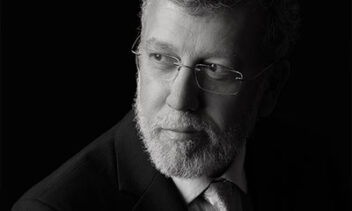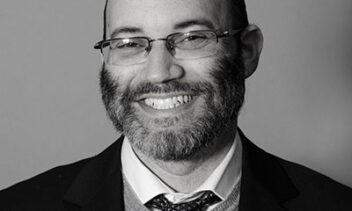After millennia of study, in many ways the Bible still remains a question mark to us, a mark of the unknown. As much as we have learned about this mysterious Book over the millennia, we may have equally learned just how little we understand. In the name of this great Book, religions have started and wars fought, acts of great love and hate committed. These acts often use the Bible as creed and cry, and one could suggest that such acts often rely on an understanding of the Book as an exclamation point, not a question mark. Humble readers of this great Book can appreciate the work as a kind of Divine question mark, a lesson to humanity about the limits of understanding. Great works inspire questions and thought, and no book has inspired more than the Bible.
This isn’t an apologetic stance towards Biblical criticism, as much as it is a plea for openness towards a position of questioning. We acknowledge that we don’t know everything about the Bible, and perhaps we aren’t supposed to.
This month, 18Forty is thinking about Biblical criticism. In this week’s weekend reader, we seek to answer the following questions: Why should a person of faith think, or read, about Biblical criticism? Why engage with such potentially dangerous material? To answer these questions, we will consider the power and possibilities of engagement with religious questions and doubts.
Loving the Questions Themselves
What do we hope to gain in discussing topics like this? One part of why we discuss topics like these is in the hopes of cultivating an attitude of openness towards the unknown, an awareness of that which we don’t know or understand. And just as importantly, we discuss topics like these because we must. Because the questions exist, we will discuss them. Instead of dwelling in the fearful shadow of the question or the comfortable shade of the answer, we may instead learn to live in comfortable tension with the questions. In his timeless ode to vulnerability and sensitivity, Letters to a Younger Poet, Rainer Maria Rilke (1875-1926), the great German-language poet, urges us towards such a position:
You are so young, so much before all beginning, and I would like to beg you, dear Sir, as well as I can, to have patience with everything unresolved in your heart and to try to love the questions themselves as if they were locked rooms or books written in a very foreign language. Don’t search for the answers, which could not be given to you now, because you would not be able to live them. And the point is, to live everything. Live the questions now. Perhaps then, someday far in the future, you will gradually, without even noticing it, live your way into the answer. Perhaps you do carry within you the possibility of creating and forming, as an especially blessed and pure way of living; train yourself for that but take whatever comes, with great trust, and as long as it comes out of your will, out of some need of your innermost self, then take it upon yourself, and don’t hate anything.
We might read Rilke’s powerful words with a slight gloss; where he tells us to love the questions themselves, but not search for the answers, we hope to love the questions themselves and search for the answers. We might try to “live the questions now,” while still seeking the answers with faith and curiosity.
And perhaps we might seek more—not only our answers, but our questions as well. We all have questions that drive our search—our existential project—and it is too easy to become numb to these questions. These may not be questions about Biblical criticism or faith, but deeply individual questions of personal meaning and fulfilment. Awareness and love for the questions themselves can birth a lived answer, in the resolution of the question through the choices one makes in life. Our lives can constitute the answer to the questions we are desperately trying to formulate, and yet articulation of the questions of our life can inform us about our own values and identity. If we don’t know our own questions, how might we ever learn to live with them?
With the right perspective, we hope to grow as humans from our engagement with life’s heaviest questions.
This openness is native to the religious sensibility; Rav Kook opines (Shemonah Kevotzim 1, 267) that the difference between fear of Heaven that is connected to the light of Torah and fear of Heaven that isn’t connected to the light of Torah is whether the “fear of sin becomes the fear of thought”:
The deficiency in the quality of fear of heaven that isn’t connected to the light of Torah is that fear of sin becomes fear of thought. A person becomes too fearful of thought, and enters the mud of ignorance, which takes the light of her soul, damages her strength, and obscures her spirit.
Fear of Heaven becoming fear of thought—a frightening, yet so very human, occurrence. By opening ourselves up to challenging questions, with faith and honesty, we can strive to have a fear of Heaven free from the shackles of fear of thought.
What To Do With Doubts
A conversation about engaging with religious questions must deal with the question of doubts: What if this leads people to doubt? To begin the conversation around Biblical criticism, it is worth considering a broader taxonomy of religious doubt.
Upcoming guest on 18Forty, Rabbi Gil Student, outlines various types of doubt in a Torah Musings article entitled “Religious Doubt in Jewish Life.” One type of doubt is what he deems permissive doubt, the subconscious doubt present in the motivation to sin:
In explaining the necessity of the concept of repentance, Rav Albo magnifies the nature of any sin (Sefer Ha-Ikkarim 4:26). How can anyone violate a command of the Almighty? The Talmud (Sotah 3a) declares that no person sins unless overcome by a spirit of folly (ru’ach shetus). While this could mean a temporary insanity or sensual distraction, Rav Albo understands the phrase intellectually. A person can only sin if he believes that God does not exist, does not punish sinners or did not give the commandments. In other words, sin entails what I call permissive doubt, even heresy, that enables you to transgress.
Rav Albo does not seem to be attributing complex intellectual calculations to the casual sinner. Rather, he is describing the subconscious intellectual process of sin. If we truly believe and remain conscious of God’s command and providence, we will never sin. Our ability to submerge this recognition, to focus our thoughts on our own desires rather than the overwhelming presence of God, requires a diminished faith. We do not fully believe or we would stop ourselves from following our desires.
Gil notes and comments on the three types of faith identified by Rabbi Norman Lamm in his fundamental work on the topic, Faith and Doubt:
Spurious doubt “does not issue from a question that expresses an authentic concern for truth” (p. 9 of the 2006 edition). A genuine doubt has to be honest, has to be humble, has to be critical of not just its object of concern but of itself. A doubt for the sake of doubt attempts to avoid truth, not seek it. In this hyper-cynical age, we must be wary of spurious doubt that masquerades cynicism as intellectualism.
Methodological doubt plays a role in acquiring knowledge. Rav Sa’adia Gaon (Emunos Ve-Dei’os, introduction, sec. 3) sees doubt as a natural starting point. Knowledge exists externally so a person must remove his doubts through study in order to arrive at truth. While not a positive phenomenon, methodological doubt serves an important role. “Certainty can be attained, but only by means of doubts that are conquered, and doubt therefore has instrumental significance” (R. Lamm, p. 11). Methodological doubt is part of a learning process, not an element of your faith. It is an abstract method of examining a problem. You believe while still trying to work out the details.
Substantive doubt is a state of questioning. It is a faith that includes doubt. “In methodological doubt, I possess and direct the question; in substantive doubt, the questions possesses and directs me” (R. Lamm, p. 11). While R. Sa’adia Gaon does not discuss this kind of doubt, R. Lamm suggests that it, too, can have value in a life of faith. It is a starting point that encourages deepening your faith. Substantive doubt, when part of a struggle, is an element of faith itself. “I begin by believing despite doubt; I end by believing all the more firmly because of doubt” (p. 15). “Doubt, so conceived, becomes not an impediment, but a goad to reinvestigate and deepen cognitive faith assertions” (ibid.).
When facing a contentious topic, such as Biblical criticism, the voice of spurious doubt might question the worth of the endeavor. The voice of methodological doubt may inspire growth in knowledge, as one wonders about the background of Biblical criticism, the responses, and the key figures. The voice of substantive doubt poses the greatest threat—the voice that moves towards rethinking the entire religious project, the providence of the Bible, and one’s own life. This voice can be generative as well, and can expand the confines of one’s available religious reality. In Gil’s words:
Methodological doubt is part of the acquisition of knowledge. Substantive doubt is part of living a life of faith. Substantive doubt feels the pull and push of emotions, the frustrations of life in all of its complexities. When a child dies tragically, substantive doubts asks why. If that is the end of the conversation, substantive doubt damages faith. If it is part of the healing or at least coping process, and it merges into a stronger faith, substantive doubt has enhanced religious life. Rabbi Lamm’s insight is the validation of substantive doubt when it strengthens faith.
Here too we might go further—perhaps substantive doubt can be worthwhile independent of its relationship with faith. Perhaps part of having a perspective of faith demands an ability to engage in doubts, to enter doubts, and to find the possibilities afforded therein. Living a life of curious faith creates opportunities to rethink postulates once simple to us and reaffirm our own faith and humility in the face of the unknown. When facing new perspectives and sets of questions, we are faced with challenges and opportunities. Rav Kook spoke best to this responsibility offered by the new, when he said “the old, renew, and the new, sanctify.” What would it mean to sanctify the new? How might the tools of Biblical criticism be sanctified? Perhaps the very act of opening up to the question, moving towards a stance of questioning faith—a faith strong enough to endure questions—constitutes the first step.
Discussing these topics demands humility, curiosity, and faith. With the right perspective, we hope to grow as humans from our engagement with life’s heaviest questions. We might murmur the desperate prayer of Nina Simone as we do:
I‘m just a soul whose intentions are good
Oh Lord, please don’t let me be misunderstood






